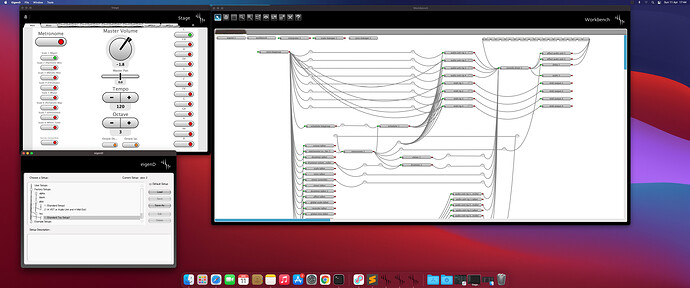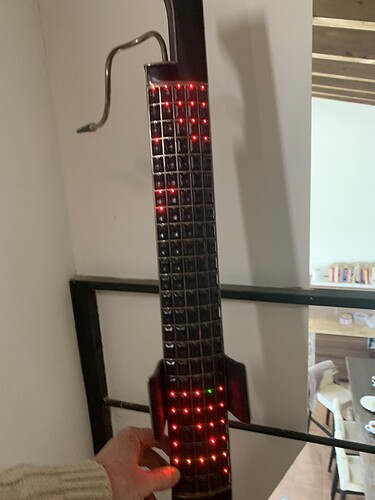Status:
EARLY PRE-RELEAE DEV TESTING ALPHA of MAC OS versions
this is NOT the official release, which will be released later to github
read included release notes, and below for status/known issues
Apple Silicon
Intel 64 bit
Note : Please only report bugs/issues which are new to this release, at this time Im not focused on ‘existing’ issues.
Requirements
- MacOs or Mac OSX 10.13+
- Apple Silicon or Intel 64 bit.
32 bit and versions of OSX prior to 10.13 are no longer supported.
Known Issues:
- limited testing

- convolution disabled for apple silicon - so cello will not work
Limitations
- can only load plugins for same architecture
- resources not installed - incl samples/convolution responses
To Do
- convolution for apple silicon
- drummer/sampler - decide how to ship samples?
- test alpha mic input (*)
- create release
- windows build
(*) someone else needs to do this, as I dont have the hardware
Tested and working
- Alpha, Tau and Pico
- Midi Ouput
- Vst/AU host
- Synth module
- t3d module
- mpe
- sampler (but you need to copy samples)
- clarinet
- Workbench
- Stage
- Release packing
- headphone output (tau/alpha)
- latest version of Juce (6.0.8)
EDIT: I’ve updated this as the main post abotu EigenD on Apple Siliton
initial post - kind of redundant now 
just a heads up… dont get excited … its not (even close to) working yet.
Apple Silicon native build of EigenD
so today Ive done a lot of the ground work for this, I can build many (most?) of the modules of EigenD on my Mac Mini M1.
however, theres still quite a lot of hurdles…
modules - most are compiling, plg_convolver is using an fft lib that has sse / intel code in it.
pico decoder - dylib is now available for arm64
juce - ive hacked the build, but likely this is going to need to be updated to the latest juce version, so it properly supports apple silicon/big sur.
pip - there seems to be an issue with modern compilers and the pip code, which is preventing me building a few things…e.g. host and midi … this is going to take a bit of thinking times.
python - so there is 2.7.16 of python installed on big sur, Ive no idea how compatible this is going to be , 2.7.10 was ok, when I did the 64 bit intel build BUT I know, the EigenD code was very fragile to changing python version. I tried python 3, and it all fell apart very quickly 
my main concern here is wxpython, a graphics library thats used… as I again, had alot of issues with this to get the 64 bit intel build working
the general takeaway here is … python and eigend are tightly bound, and efforts Ive tried to upgrade to newer versions have been unsucessful causing locks in the bowels of python (I think GIL is an issue) - I got the 64 bit version, but finding a combo of versions that work BUT with apple silicon, we wont really have that choice!
the upshot of all of this is… even when I can get it all to compile (which Im pretty close to), its likely to still be quite alot of work to get it to actual function (e.g. new juce version, figuring out python)
you’ll find what Im up to on this in the applesilicon branch of my EigenD repo.
Eigenharp Hardware on Apple Silicon
my basic tests with MEC, were promising on M1 - but I need to finish this off, and check the underlying usb /eigenharp comms is working - if it works on MEC, it’ll likely work on EigenD.
EigenD existing 64 bit build under Rosetta 2?
I’ve no idea if the EigenD 64 bit build will work under Rosetta 2 or not.
whilst Ive been really impressed with Rosetta generally, I think EigenD has a bit of a unique problem… its using python…
really it goes back to issue above with Python … can we use the Python 2.7 present in BigSur, with the added compilcation of an Intel/Rosetta binary, working with that arm python install.
honestly, at the moment, Im not looking at this… for the simple reason, to get it to work might require me to change the ‘default python install’ and generally mess around with my M1.
and I think for now, Id prefer to keep the M1 ‘clean’ , so that if the ‘native build’ works, I know its not because Ive been hacking it … i.e. that build will work on others M1 without changes.
if someone else wants to give it a go then that would be cool - as it might contribute useful information that can be used for the native build.
note: id advise, install the 64 bit build but do NOT install python as indicated in release notes, rather try to use the python thats already installed in /System/Library/Frameworks/Python (or similar)



